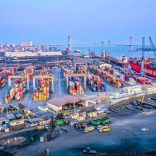Mozambique: Quelimane Municipal staff demand five months of wage arrears - Watch
Mozambique: VAT levied increased to €1.14 B in 2024 but missed budget target

FILE - For illustration purposes only. [File photo: RM]
VAT collected by Mozambique increased by 20% in 2024, to 76,396 million meticais (€1.140 billion), but missed the 2024 state budget target, according to official figures that Lusa had access to on Tuesday.
According to figures from a budget execution report from the ministry of finance, the Value Added Tax (VAT) collected in Mozambique in 2023 was almost 63,455 million meticais (€947 million).
In the 2024 state budget, the Mozambican government planned to collect 92,904 million meticais (€1.386 billion) in VAT in 2024, a target that was only 69% realised.
The amount collected in VAT by the state is also reduced by 15,096 million meticais (€225.2 million) in VAT refunds.
Overall, the Mozambican state collected 344,836 million meticais (€5.145 billion) in current revenue, namely taxes, last year, corresponding to 98.5% of the annual forecast, according to the government.
On Sunday, the Mozambican president announced the possibility of removing VAT on basic necessities and intervening to reduce fuel prices in order to alleviate the cost of living.
“We are working to find various solutions and one of them is to take the products in the basic basket of the Mozambican people and work to see the possibility of removing VAT, which is what makes the products in the basic basket more expensive,” said Mozambican president Daniel Chapo at a press conference in Addis Ababa, the Ethiopian capital, taking stock of his first participation in the 38th African Union (AU) summit.
At issue are the successive demonstrations and stoppages in the country, in which, as well as contesting the results of the general elections on 9 October, Mozambicans are complaining, among other things, about the high cost of living and the lack of jobs.
Speaking to the press, Chapo promised to present measures to reduce the cost of living at the next Cabinet meetings, specifically with regard to the issue of taxes on these prime necessities.
At the same conference, the Mozambican president agreed to intervene with government measures to reduce fuel costs, which, he said, make products more expensive for the consumer.
Mozambican businesspeople had previously asked the government to exempt them from paying VAT on products considered basic necessities to offset the impact of the demonstrations and stoppages.
“On a fiscal level, we are proposing the removal of VAT on oil, soaps and sugars, including chickens and eggs, which are basic products of great interest to the most disadvantaged sections of society,” said the president of the confederation of economic associations of Mozambique (CTA), Agostinho Vuma, on 12 December 2024.
The CTA estimated to Lusa on 30 December that more than 500 businesses were vandalised during the post-election demonstrations in Mozambique and at least 12,000 people are now out of work.
Since October, at least 327 people have died, including around two dozen minors, and around 750 have been shot during the protests, according to the electoral platform Decide, a non-governmental organisation that monitors electoral processes.
The demonstrations and stoppages were first called by former presidential candidate Venâncio Mondlane, who does not recognise the results.
The protests are mainly organised by young people, who are questioning the 50-year rule of the Front for the Liberation of Mozambique (Frelimo) and, in addition to the argument of electoral truth, include unemployment and low schooling as motivations, which, of Mozambique’s 32 million people, affects a third of the approximately 9.4 million young people.













Leave a Reply
Be the First to Comment!
You must be logged in to post a comment.
You must be logged in to post a comment.